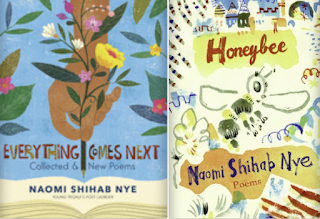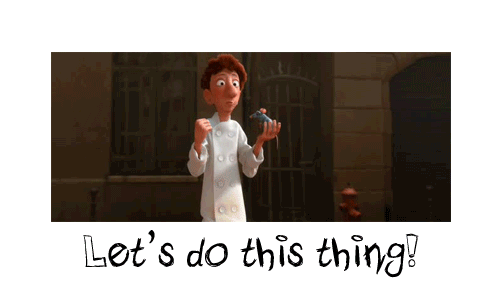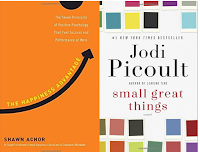We just completed our 2nd full week of online learning. We started with a 3-day week, then had Spring break. So last week was our second full week of this new, online learning. The journey has not been an easy one. As teachers and students grieve the community space we know and love, teachers are also trying to support students and families during this pandemic.
The first week of online learning was easy. And boring. I put some things out there and kids did them. We were lucky to be able to send lots of books and some supplies home with kids before schools closed so that made things a bit easier. My kids were already comfortable with many tech tools, so I wasn't worried about that.

But at the end of the week I was frustrated and depressed. What I was doing wasn't teaching. How could I be teaching when students did the work in their homes, while I sat in mine? There was no laughter, there were no inside jokes, no greetings and no book talks. I mean the libraries are closed. Never in a million years did I imagine a world in which there are no libraries.
I missed the big kitchen table in our classroom and the way that kids would gather when they needed a bit of community support. I missed read aloud and the collective thinking of this amazing group of 5th graders. I missed the conversations on the way down to lunch and I missed watching friendships develop. I even missed indoor recess --and all the noise that goes along with that. I realized again that every single minute in a classroom is a minute that teaches us something about a child in our company. I've always known how quick little conversations with kids add up across a school year but the absence of all of these quick conversations made it so much more clear.
When I was able to reflect last week, I knew I could create lessons. I knew I could find resources online. I knew my kids could use the online tools easily and effectively. I knew we had Google Meet and we could gather in real time. But the thing I couldn't figure out was how I could possibly teach without the listening and watching. I teach by listening, by talking to kids individually, by checking in. I believe that my best teaching is in listening and observing children in the midst of learning and making sense of things.
So, I started to wonder about listening in this new world of school. What does listening look like? What
could listening look like now? How could I create an online space that felt more right? That felt more like our real, physical space? How could I listen and be responsive to individual students and to the classroom as a whole? How could I know what they needed? How can I be more myself as a teacher in this space and how could my students be more themselves?
One of my students said something amazing last week before a read aloud. She said, "I don't feel like I'm learning anything at home. I mean, I am learning new things but I don't get that happy feeling I get at school when I learn new things. I don't like that we can't turn and talk and hear other people's thinking. It just doesn't feel like learning."
So this last week, instead of spending my time finding as many great resources online as I could, instead of trying to find things kids could do independently, I spent time (thanks to
Clare Landrigan) thinking about what was most important to our classroom community and what was most important to me as a teacher. I believe in student choice and agency. I believe in invitations over accountability. I believe in authenticity, connectedness and intentionally. And I believe that if I am not learning, my students are probably not learning either.
And then I set up things that, even though they were asynchronous, gave me ways to listen. Just like at the beginning of the year, when I slow down and listen and watch, I did a lot of that this week. Even though they were nothing like being in a classroom together, my focus was on listening and learning from my students and that helps me plan better, I think.
Once I figured out that it was the LISTENING that was missing and that I cannot teach without learning from my students and allowing my students to learn from each other, I went from feeling like this:
to feeling like this:
So, here are some things that helped me listen and learn over the last week or so. These things helped make our online classroom feel just a TINY BIT more like our real, wonderful classroom.
6 Word Memoirs-I asked my kids to write 6 Word Memoirs and they posted them on a class Padlet. I was hoping that this was a type of writing would be an invitation for students that they could spend as little or as much time as they wanted on. They could process what this time has been like for them or write a 6 Word Memoir about something else. They could add art, but they didn't need to. I could see where their thinking was, and I figured most kids would do this as it is a quick, low stress kind of writing play.
Friday Letters to Me--Each Friday during the school year, my students write letters to their families about their week's learning. Last week, I asked kids to write letters to me. Not necessarily about their learning but just a letter about how they are doing, how they are spending their time, how things are going, etc. They did these on Google Docs so I could respond individually.
I created a
Padlet called "Stuff We Are Doing" and invited kids to share things they are making, books they are reading, ways they are helping etc.
I wanted to touch base with families without adding stress. So, I sent individual emails to families just checking in--inviting them to let me know how things were going.
We've had
daily Live Read Aloud via Google Meet. This gives us time to come together around a good story and to also have time to stop and talk. It isn't quite the same as being in the classroom, but it does feel like our old routine and our conversations have grown more natural as the week went on. We also use this time to catch up--I open the meet about ten minutes early and have time to chat with students as they log on and as the group goes. We were even able to use this time to sing Happy Birthday to a few classmates last week!
Flipgrid has been my favorite tool during this last week. It seems to be the place where students are themselves and where they can share and feel like they are talking to and with classmates. They seem confident and happy in this space. So, we've used Flipgrid for a few screenless Science challenges as well as some student-led Classroom Bookadays. Then, in a conversation this week, one of my students suggested we make a
FLIPGRID AT HOME so kids could post videos of things they are doing. Almost like a talent show but more inclusive in terms of things kids could include. They are thinking playing songs on instruments, baking, introducing us to a pet, etc. I am anxious to see this Flipgrid grow.
If you haven't seen
Georgia Heard's poem, "WhenWishes Return", this was an incredible conversation. I had a Google Meet to just answer questions and chat on Thursday. About 9 kids showed up. I pulled up this poem as they had read it earlier in the week and we just chatted, looking at the poem. For a few minutes, I forgot we were online as the conversation was so much like so many we've had in our classroom. This poem invited such rich conversation. It was accessible. It had depth and it was relevant. I realized that this was something we were missing--the rich real time conversations that happen every day in the classroom around important ideas in text. At the start of every class meeting, we usually start with a shared book or poem or topic of discussion. Talking about texts beyond just our read aloud
in real time is going to become an important part of our routine moving forward.
Finally, my students told me they miss the
small group time. That they love seeing the whole class, but they
also want to meet live in small groups around tings we are learning. So, I created some Invitational Book Clubs and some choice writing for kids who were interested. Next week, I'll offer small group conversations and keep building on those.
The most important thing I did this week was to
open up Comments on anything the kids turned in. Rather than turning something in just to me, I asked them to post it on a Padlet or on Google Slides so that others could learn from and respond. I love Flipgrid because it allows video comments. By making "commenting" part of the daily learning plan that I sent out each day, students were invited to learn from each other and I could tell how important this was to students by the number and sincerity of their comments.
Like every teacher in the world right now, I'd much rather be in the classroom.
And I am sad. So sad. But, this journey is definitely one in which I am learning every day. I'm not sure what next week will bring. But my main focus after much reflection is on trying to remain true to what I know is important whether in the physical classroom or not. So for now my focus is to make sure that whatever I put out there for my kids to "do," it is something that allows me to listen and learn, to give them space to be who they are right now and to share their voices. If I am listening and learning as if I were in the physical classroom, my hope is that they are too.















































































